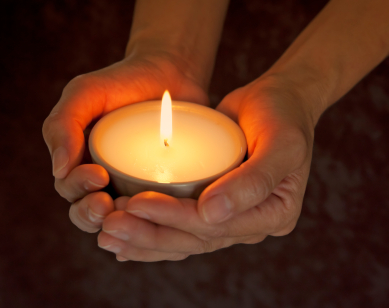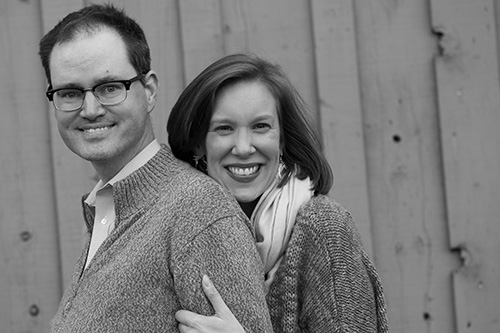Back to series
The Body of Christ
A Miracle
Defying the Odds
Fall-Out



Alive Due to Divine Intervention
Click here to open a Print - Friendly PDF
"Catherine, he’s by far the sickest person here.” I sat on the edge of a chair at Virginia Hospital Center in Arlington as an intensive care unit (ICU) nurse explained what was wrong with my husband, Wallace. Just forty-eight hours earlier we’d been enjoying a wonderful, warm spring day, playing on the playground after church with our two daughters—Caroline, age four, and Lucy, eighteen months. Now Wallace was in the ICU on life support, his heart, kidneys, and lungs having failed.
Last year, my forty-one year-old husband nearly lost his life. The trauma of the experience is on a level that we are still trying to comprehend and process. The healing that took place, however, was even greater.
Caroline was the first to come down with a fever. Soon Wallace had one. Neither had any other symptoms, but when Wallace complained that he couldn’t catch his breath, we headed for the emergency room (ER). Little did we know that he was only a few hours from death.
With blood pressure of 65/20, he was, unbelievably, able to walk into the ER. They tested his heart, took his blood, and tried to give him oxygen. It didn’t help. The ER doctor told Wallace he could be intubated, sedated, and receive oxygen through a ventilator. “Do whatever it takes,” Wallace said. “I just want to be able to breathe.”
So he was sedated and intubated, and that was the last time I talked to him for nearly two weeks. I remember standing at the edge of the room, looking at my husband, not knowing what was going to happen. Caroline was at home with a fever, in the care of our nanny. I suddenly panicked, wondering whether she, too, might develop breathing problems. Then I fainted. The next thing I knew I was sitting in a chair being offered juice and crackers. “Do you need to be admitted?” a nurse asked.
“No, I just need some time to recover.” I’ll be fine. I’ll be fine. What will happen to our girls if I too, end up in the hospital Soon I met Dr. Jeff Hales—the pulmonologist and critical care doctor from the ICU. I had no idea, then, how important this man would be in saving Wallace’s life.
They thought Wallace had pneumonia, but they weren’t sure why. They had taken cultures of his blood, but it would take forty-eight hours for bacteria—if it was the cause—to grow and reveal what was making him so ill. They were very interested that Caroline, too, had a fever, which led them to believe she and Wallace had contracted the same bug. They gave Wallace broad spectrum antibiotics, oxygen through the ventilator, vasopressors to support his heart, and goodness knows what other medications.
When the first of many bronchoscopies revealed that Wallace had fluid in the pleural space around his lungs, a drainage tube was surgically inserted. He was assigned only the most experienced ICU nurses that week, who worked harder than anyone I’ve ever seen. And more than fifty doctors would work on his case before he eventually left the hospital.
The Body of Christ
 In his letter to the Corinthians, the apostle Paul likens followers of Christ to different parts of the body—all working together in concert. Each part plays a unique and important role. When Wallace’s own body was broken, it was the body of Christ who came to our aid.
In his letter to the Corinthians, the apostle Paul likens followers of Christ to different parts of the body—all working together in concert. Each part plays a unique and important role. When Wallace’s own body was broken, it was the body of Christ who came to our aid.
The first member of the body to arrive was my Aunt Susan, who showed up in the ER. She helped me think through many pressing family matters and prayed for wisdom for Dr. Hales and the other doctors. We had no idea then, how important a prayer that would be.
For weeks I was at the hospital every day from the early morning until early evening. My mom had come to watch the girls, and Wallace’s parents went to the hospital every day. Our nanny, Yenny, a nursing student, gave up a whole summer of classwork to help us. Friends and family provided meals; some even sent us breakfast! I didn’t cook for two months.
My sister offered to coordinate updates and specific prayer requests. Early one morning that first week, my mom, Aunt Susan, and a friend from church—Molly—gathered in Wallace’s ICU room to pray. They anointed him with oil and prayed over his feet—that he would one day walk again. Lord, hear our prayer.
A medical diagnosis at first seemed a relief: he had contracted strep Group A—the common bacteria responsible for strep throat. Yet there were puzzlements; this particular strain of strep rarely causes pneumonia . . . septic shock . . .
organ failure.
Caroline, also diagnosed with strep, had responded to antibiotics and was recovering. But despite penicillin, which is 100 percent effective against strep Group A, Wallace wasn’t getting better.
His heartbeat had become arrhythmic, and his kidneys had shut down, requiring continuous dialysis. Would his kidneys ever recover? Doctors couldn’t say.
A Miracle
Four days after we’d first arrived, the doctors went into Wallace’s ICU room early in the morning, amazed to find that his chest drainage tube had fallen out. A nurse friend of ours told us she had never heard of this happening. It had been surgically inserted deep into his lung. It would require surgery again to reinsert it, which was risky in Wallace’s compromised condition.
That morning during her prayer time, our friend Molly sensed that there was something hidden in Wallace and prayed that the surgeon would find it. A CT scan, ordered by Dr. Hales, revealed a thick layer of infection on Wallace’s lung that would surely spread and take his life, if not removed. Surgery was set for 3:30 that afternoon, to be performed by cardio-thoracic surgeon, Dr. John Garrett, a praying man who sometimes invited young men and women from our church to join his surgical practice as volunteer interns.
Before the surgery, at my request, Dr. Garrett’s physician assistant and I joined hands with the ICU nurse, while he prayed powerfully and with great insight over Wallace and his impending surgery. Clergy and others also prayed for him.
When the anesthesiologist came into the room to take Wallace to the Operating Room, his expression was grim. Mom and I told him we’d pray that God would guide his every step. He looked at us and said simply, “Thank you. I will need him.” Wallace’s odds of surviving even the anesthesia were extremely low.
When they took him to the OR, Dr. Garrett’s nurse told me she would call me once the doctor had made the first incision—this was assuming Wallace survived the anesthesia.
A group of us—mostly family—had gathered now. We waited intently for my phone to ring. Yes, Wallace had survived the anesthesia. Two hours later Dr. Garrett walked through the doorway. “Catherine,” he said, “your husband is really sick.” It turns out that there was very little infection on his lungs, contrary to what had shown up on the CT scan. I can’t imagine the mood in the OR, when it seemed they had “gone in” for nothing. But then, right at that moment, as if to answer the question, Wallace went into cardiac arrest.
Dr. Garrett manually squeezed and started Wallace’s heart, and as he did so, to everyone’s great surprise, infection streamed out of the heart sac. After a second arrest, Dr. Garrett opened the heart sac and removed all the infection. Imagine. If the chest tube hadn’t fallen out, Dr. Hales would not have ordered the CT scan. And if the CT scan hadn’t been wrong, they most certainly would not have done the surgery that found the hidden infection, that saved his life.
Wallace could not have been in a better place and time to go into cardiac arrest—in the cardiac OR with the surgeon’s hand on his heart.
A few months later, Dr. Hales reminded us that Aunt Susan had prayed for him to have wisdom that week. He said it was a miracle Wallace survived because he made decisions that week—about the CT scan and the surgery—that were clearly inspired.
Defying the Odds
 The next forty-eight hours were dicey. Even though they’d found the mother lode of the infection, we didn’t know what other infection might be hidden in his body. And of course he was very susceptible to additional hospital-acquired infections.
The next forty-eight hours were dicey. Even though they’d found the mother lode of the infection, we didn’t know what other infection might be hidden in his body. And of course he was very susceptible to additional hospital-acquired infections.
Mom and I spent a sleepless night in the ICU. I remember being afraid to shut my eyes for fear that we would lose him if I did. In the morning, the nurse assigned to care for him all weekend, who happened to be a member of our church, prayed for him; my uncle, a pastor, led us in communion and prayer for healing.
If I thought I’d had support before the surgery, now the spiritual push increased. Friends and family came from near and far—from North Carolina, Kentucky, Pennsylvania, Texas, New York, and Florida. They brought food and read the Bible over Wallace; they played soothing music and held a prayer vigil. Someone even set up a Starbucks coffee station, for whoever needed a boost while praying for Wallace.
It seems the strep bacteria, after being treated by antibiotics, had released toxins into Wallace’s bloodstream. That night he was diagnosed with toxic shock syndrome—which is often fatal. One friend later told me she was sure we’d be attending a funeral the following week.
Incredibly Wallace survived toxic shock syndrome. Six days after we had entered the ER, a cardiologist used a camera scope to check Wallace’s heart function. To his amazement, its pumping capacity was almost back to normal. Nearly two weeks after he had entered the ER, they took Wallace off of the ventilator and off of sedation.
There were subsequent complications, including a secondary infection and considerable blood loss from ulcers. But after just four weeks, his kidneys bounced back; he was taken off dialysis.
He had lost thirty-five pounds, including nearly all of his muscle mass. When he finally came home after six weeks, he could walk only short distances; if we went anywhere as a family, he had to go in a wheelchair. Having two small children, we didn’t go many places!
Fall-Out
As a result of his illness, Wallace’s solo public relations consultancy had to be folded, and I had only two weeks of paid federal leave time. Amazingly friends and total strangers donated four months of leave to me so I could be home. We also received gift cards to buy groceries. And that is what we lived on. Donated leave and donated food. The girls were incredibly resilient. When we could not be there for them, others stepped up. Friends and family babysat, sent toys, books, games, and DVDs.
After seven months of hard work, just before Christmas, Wallace completed his physical therapy and cardiac rehabilitation. Not one doctor would take credit for Wallace’s recovery. Dr. Garrett said that God had guided his hands. We later saw the anesthesiologist and thanked him profusely for his skill. He said he had nothing to do with it and pointed heavenward. Wallace’s infectious disease doctor told me that Wallace was alive due to great luck. Then he paused, corrected himself and said, “No. He is alive due to divine intervention.”
Dr. Hales commented on the number of people who came to support Wallace. His hospital room was covered with encouraging notes, words of Scripture, drawings, and pictures. One ICU nurse told Wallace that when she was having a bad night, she would quietly slip into his room and soak up the atmosphere—so warm and inviting. And so then it became our turn to take no credit and point to heaven.
 After he’d been home awhile, Wallace started to worry about how he could ever repay everyone for all they’d done for us. I mentioned his concern to a friend who had been at his ICU bedside. Her response was that she had been witness to a miracle, and that was payment enough. “He’s already repaid me in a way no one else can,” she said. “My faith has been strengthened, and I will remember what happened for the rest of my life.”
After he’d been home awhile, Wallace started to worry about how he could ever repay everyone for all they’d done for us. I mentioned his concern to a friend who had been at his ICU bedside. Her response was that she had been witness to a miracle, and that was payment enough. “He’s already repaid me in a way no one else can,” she said. “My faith has been strengthened, and I will remember what happened for the rest of my life.”
But as the C.S. Lewis Institute’s Tom Tarrants has commented, not everything ends tied up neatly, with a bow. Wallace’s final release from outpatient rehabilitation brought new stresses. He had been at the hospital every day for seven months and with the help of many people there, had overcome death. Leaving was like losing a job.
And beyond our own household we ask questions. One of Wallace’s oldest and dearest friends, also in his early forties, who came to visit him in the hospital, passed away—due to an aggressive cancer—not ten weeks after his visit. We also learned about two young fathers who did not survive the same illness as Wallace. We mourn for these losses and don’t understand why Wallace survived and they didn’t.

When asked at a dinner party about his year, Wallace replied, “To quote the queen, it’s been an annus horribilis.” We later looked up that Latin phrase, used by Queen Elizabeth II in her 1992 Christmas Day address to describe a particularly difficult year for the royal family. Its meaning is the opposite of annus mirabilis, which means “year of wonders.”
“Horribilis” and “mirabilis.” We decided that, for us, this year was both.

Catherine Sanders
AuthorCatherine Sanders, Author, is a former Fellow at the C. S. Lewis Institute and lives in Falls Church, Virginia. She has worked as a speechwriter for the Secretary at the U.S. Department of Veterans Affairs. Previously she worked at the Corporation for National and Community Service and the U.S. Department of Justice. She spent eight years in journalism–in print, radio, and television. Her book, Wicca’s Charm: Understanding the Spiritual Hunger Behind the Rise of Modern Witchcraft and Pagan Spirituality was published by Random House’s Shaw imprint in 2005.

 COPYRIGHT: This publication is published by C.S. Lewis Institute; 8001 Braddock Road, Suite 301; Springfield, VA 22151. Portions of the publication may be reproduced for noncommercial, local church or ministry use without prior permission. Electronic copies of the PDF files may be duplicated and transmitted via e-mail for personal and church use. Articles may not be modified without prior written permission of the Institute. For questions, contact the Institute: 703.914.5602 or email us.
COPYRIGHT: This publication is published by C.S. Lewis Institute; 8001 Braddock Road, Suite 301; Springfield, VA 22151. Portions of the publication may be reproduced for noncommercial, local church or ministry use without prior permission. Electronic copies of the PDF files may be duplicated and transmitted via e-mail for personal and church use. Articles may not be modified without prior written permission of the Institute. For questions, contact the Institute: 703.914.5602 or email us.
-
Recent Podcasts
Ralph Waldo Emerson’s Philosophy and Influence
by David George Moore on July 26, 2024Ralph Waldo Emerson was a gifted nineteenth century...Read More
-
The Side B Stories – Nate Sala’s Story
by Jana Harmon, Nate Sala on July 19, 2024
-
Terrorism Through the Eyes of Faith
by Dennis Hollinger on July 12, 2024
-
Recent Publications
Hasn’t Science Proven That Belief in God Is an Outdated Superstition?
by Sharon Dirckx on July 1, 2024Many assume that scientific practice and belief in...Read More
-
Has the Bible Been Corrupted as Some Muslims Claim?
by Andy Bannister on June 1, 2024
-
Seeing Jesus Through the Eyes of Women
by Rebecca McLaughlin on May 15, 2024
0
All Booked
0.00
All Booked
0.00
All Booked
22194
C.S. Lewis’s The Abolition of Man Live Online Small Group 8:00 PM ET
https://www.cslewisinstitute.org/?event=c-s-lewiss-the-abolition-of-man-study-course&event_date=2024-10-02®=1
https://www.paypal.com/cgi-bin/webscr
2024-10-02

Next coming event
Days
Hours
Minutes
Seconds
C.S. Lewis’s The Abolition of Man Live Online Small Group 8:00 PM ET
On October 2, 2024 at 8:00 pmSpeakers

Catherine Sanders
Author
Team Members

Catherine Sanders
AuthorCatherine Sanders, Author, is a former Fellow at the C. S. Lewis Institute and lives in Falls Church, Virginia. She has worked as a speechwriter for the Secretary at the U.S. Department of Veterans Affairs. Previously she worked at the Corporation for National and Community Service and the U.S. Department of Justice. She spent eight years in journalism–in print, radio, and television. Her book, Wicca’s Charm: Understanding the Spiritual Hunger Behind the Rise of Modern Witchcraft and Pagan Spirituality was published by Random House’s Shaw imprint in 2005.





